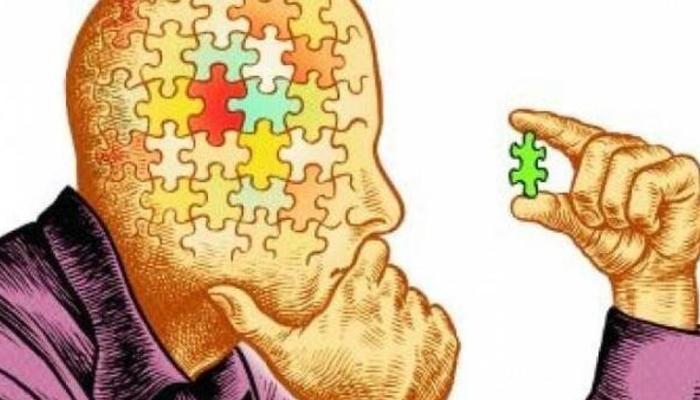To Be Different, To Be Me
We change all the time, against our will and with our intention.
In the end, within all the changes, who are we, really?

Image Credit
The idea that someone "He is no longer the same person" is a surprising idea.
The sentence sounds philosophical-perhaps even vague.
However, it is also very accurate and captures the deep feeling that it is no longer possible to identify someone we once knew. Many of us saw someone they loved changing so dramatically that it seemed that he had become a completely different person.
Drug addiction is an excellent example of this phenomenon in which man is no longer the same person: mother sees the addiction that turns her son into a shadow of the previous one. Other examples may stimulate the same feeling. A broken relationship or divorce changes a friend until we think he is another person. And so does Alzheimer's disease - which affects almost half the elderly in the United States. A parent or relative has Alzheimer's disease and it seems that the person we knew once disappeared. Many experiences can cause such fundamental changes that friends or family members who are well-known to us suddenly become completely different people.
The idea that change is a fundamental matter of self-identity is clarified through a philosophical thought experiment. Think of yourself as a newborn baby. 15 years after your birth, your friends and family see a person who is completely different from the one born. This boy has a larger body, a sharper thought, deeper values, and a richer social life. In most significant respects, the boy is not at all like the baby. But there is no doubt that they are the same person. For you and the baby to be the same person, we do not expect them to be exactly the same. In fact, to see the same person, there are many ways in which you are supposed to be completely different than you were as babies.
Philosophy often emphasizes the importance of being the same person, despite the change. Philosophy asks how different changes in total loss of memory or brain transplantation may create another person. This makes it easier to clarify aspects of personal identity and self, but also to ignore our intuitions about the importance of change itself.
The ideal or appropriate way for sustained existence in time is not to remain unchanged.
On the contrary, it requires change.
The importance of change is not limited to the way we speak or reflect on self-identity. Underlying various practical considerations are assumptions about the changing self that is not static.
For example, a bank account in which a minor is accumulated for a child when he grows up is based on the assumption that the beneficiary will be very different from the current child. A bank account for a person who is the same person as the child, but does not have the linguistic, mental, and moral abilities of a small child. Many long-term commitments are of a similar nature: they anticipate or anticipate change or development, rather than identity.

Image Credit
Philosophers have pointed to cases in which changes raise practical questions. For instance, some personnel changes seem to require a breach of a promise - ostensibly given to another person. But in the case of the trust fund, if the adult is the same as the child, we may wonder whether it is appropriate to give him the money, which would bother us less if it evolved (and is now different). The conditions governing these judgments do not require a static identity, but rather a change over time.
What conditions encourage types of ideal transformations?
These material changes are not random. In our thought experiment, the appropriate changes were those that attested to the infant's development according to its purpose.
The experiential experiment demonstrates a radical change that corresponds to the individual identity and even seems essential to the self of that person. After all, we will not encourage a girl to aspire to resemble a baby, for fear of losing her true identity. In order for the girl to be the same person as the baby, she must change substantially, a change that has a purpose: learning language, developing social abilities and adopting moral values.
Everyday life presents countless examples of purposeful changes that contain the preservation of identity. At times, extreme changes point to the nature of the human being or to the self that is deeply embedded in it.
There is no doubt that a commitment in a relationship, a thriving in a new career or the cultivation of a new and worthy hobby change us, but this change takes place in harmony with our self-narrative. These changes do not make us "less of us." On the contrary, it seems that these changes help us to be ourselves.
In the history of philosophy, change appears as an essential concept for myself. The philosopher Plotinus, the son of ancient Greece, used the image of self-sculpture.
He preached "removing all that is unnecessary, aligning everything that is crooked, enlightening everything that is hidden and investing efforts in striving for radiant beauty, without stopping for a moment to work on the sculpture until it shines within you in the heavenly radiance of the virtue." This refers to self-change because it does not sabotage personal identity. On the contrary, it exposes the aspects of the true self.
Image Credit
Hundreds of years before, the Chinese philosopher Mencius described humans as cultivating the seeds of virtue, the good quality. If we grow to be good people, we seem to have grown the right way and nurtured the seeds of virtues. It is important to note that we are born as seeds of degrees, not as developed trees. We are not born perfectly well and as we develop we continue to maintain the very same goodness. In fact, we are born when we have seeds of degrees only, and these bloom as we develop.
The idea that there is something deep inside, whether it is a heart or a sculpture, a seed of good quality or a guiding idea that you can "become what you are." These evoke an important sense of development that has the purpose. If all goes "well," the future ego will not be the same as the present ego. The future self is supposed to be a version of the present ego, but different, because it is a developed version according to purpose. And often, the future self-represented a blooming or thriving version of the earlier self that contained the tiny seeds or clues to the future.
Understanding such a change requires a deeper thought about purpose. What does evolution mean by purpose? Human purposes are complex, so let us first examine the purpose of something simpler. Consider a pine cone. The purpose of the pine cone is to develop into an oak tree. We may associate this purpose with a particular acorn in different ways.
For example, because we know that usually pine cones grow to be oak trees, we may see a certain cone as having this purpose. But we also give this purpose in retrospect. When we see something unrecognizable growing to be an oak tree, we may look back and see growth as an oak tree one of the purposes of that thing. Furthermore, when we discover that this particular pine cone has grown to be a very tall oak tree, we may think that growing to a very high oak was the particular purpose of that previous cone.

Image Credit
The supposed purposes of man are wider, and includes the development of language and values, and turning into social and moral production. But there are also similarities to the pine cone. We know many of the purposes of humans only theoretically. For the most part, people develop language and morality, and babies seem to have such a purpose - even when the babies themselves do not exhibit any linguistic or moral behavior.
The same type of inference may also be appropriate for more personal purposes. Maybe when it turns out that a certain child has grown up to be a gifted athlete, we can even look back and think that this particular purpose was there, in the little boy who was - even before this child demonstrated abilities to prove it. It is often possible to identify key aspects of a person's personality in seeds planted in his youth.
The dynamic and purposeful conception of the self-contradicts certain discussions about personal identity. These discussions focus on what remains constant and ongoing despite the change, thinking that this continuity involves imagination or identity. In the broad sense, this purposeful concept involves imagination, the existence of a similar purpose throughout life. We often have no idea what we are until this purpose is realized.
The fear of not knowing what we are, or of our purpose, raises questions about "life-changing experiences." These are experiences that change people in a profound and unexpected sense: the birth of a child, military service, a new career, imprisonment or falling in love. The decisions that lead to such experiences pose difficulties for decision-making theory. How can we appreciate what we do not know? We can, of course, consider some unsafe decisions. Although I have never started a tequila-based diet and chocolate bars, I suppose that's a bad decision. But other decisions whose consequences are unknown are more difficult to assess, because the person I become by virtue of that decision is, in some profound and fundamental way, different from my present self. For instance, the birth of a child may lead to a personal change so deep that it is difficult to even assess what it involves. A list of 'pro' and 'against' from my current perspective may not represent the decision correctly because the 'I' created by the birth of the child is so radically different from my current self.

Image Credit
The intuitions concerning the importance of personal change provide a possible answer to these problems. The key is our faith in the Absolute. Just as we think a pine cone should grow to be an oak tree, our intuition says that a baby is supposed to develop, grow, become smart and become a moral and social creature. Learning a language is a life-long experience, but we have no doubt that it preserves and enriches your personal identity, and does not sabotage it or impair the true self. It seems that radical changes like language acquisition make us evolve into being the people we are supposed to be - though they make us a completely different person.
However, humans differ in important ways from plants and other animals. Our purposes seem broader than those of nature or even culture. While the pineal's sole purpose is to grow to be an oak tree, humans are multifaceted creatures with varied potential. This implies the existence of an exciting but dangerous side in the purposeful self.
Often, it seems that we are now becoming clearer with time. To make this clear, consider examples of great achievements. Imagine the little boy growing up to be a great artist. In this case, we contemplate the earlier years and see the seeds of art in the young man. This judgment may be misguided or misguided. Perhaps this is not really the goal of that person. But that's what we often tell ourselves.

Our intuitions about human purposes raise deep and problematic questions. What makes us see the purposes and purposes of different people? Moreover, the entire discussion has so far focused on ostensible purposes. But are these purposes real or illusory? If they are real, are they relevant at all to the personal identity or the real self? Or are we left, even if we do not realize these ends?
It leaves us with a complicated place. Our perceptions of self and identity are trapped in a network of beliefs about purpose. Understanding the ego as dynamic and purposeful indeed provides clarity and insight. In contrast to the concept of identity as static, we are supposed to adopt a model and criteria of identity that have developed, at least those who recognize our moral and social development. Not all changes threaten our identity, and we should gladly accept meaningful and meaningful changes to our self. But we must also be wary of reckless theological conclusions.

Image Credit
Despite these questions regarding the limits of the relevance of the purpose of identifying and myself, for now, these reflections provide modern morality. While the questions about personal identity emphasize the importance of continuity despite the change,
For example, by maintaining the same body or brain - we need to recall the great importance of change itself. Every concrete example of ongoing personal identification includes enormous changes - whether it is the development of language, social or moral; The discovery of hidden desire; Coming out of the closet; Career changes; Falling in love or ending love; Establishing a family or finding a family. Such dynamism does not question our identities. On the contrary, these changes represent some of the most important aspects of our identity.





Until next time, thank you for visiting @nirgf
Feel free to leave a comment below!

rocks as always, I learned from this post.
I Like your new logo
Thanks, I like your comments
You know who you are? My philosophy teacher asked us that question and we did not know what to answer, many said his name, and the teacher answered them .. that's you? your name ?, others your dreams ..
Sounds like you have a nice teacher
This post has received a 1.03 % upvote from @buildawhale thanks to: @nirgf. Send at least 1 SBD to @buildawhale with a post link in the memo field for a portion of the next vote.
To support our daily curation initiative, please vote on my owner, @themarkymark, as a Steem Witness
This post has received a 2.48 % upvote from @booster thanks to: @nirgf.
Great post .
Thanks
Congratulations! This post has been upvoted from the communal account, @minnowsupport, by ${username} from the Minnow Support Project. It's a witness project run by aggroed, ausbitbank, teamsteem, theprophet0, someguy123, neoxian, followbtcnews/crimsonclad, and netuoso. The goal is to help Steemit grow by supporting Minnows and creating a social network. Please find us in the Peace, Abundance, and Liberty Network (PALnet) Discord Channel. It's a completely public and open space to all members of the Steemit community who voluntarily choose to be there.
If you would like to delegate to the Minnow Support Project you can do so by clicking on the following links: 50SP, 100SP, 250SP, 500SP, 1000SP, 5000SP. Be sure to leave at least 50SP undelegated on your account.
Nice story
This post has received a 0.06 % upvote from @drotto thanks to: @banjo.
Very interesting angle. Good piece.
Thank you very much
This post has received gratitude of 4.07 % from @appreciator thanks to: @nirgf.